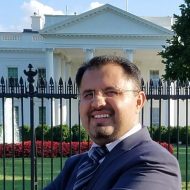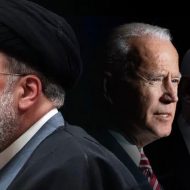When on December 25, 1991, the Soviet hammer and sickle insignia was replaced by the Russian tricolor flag, there was a tremendous excitement in Washington. Many analysts declared the end of the bipolar world and the termination of the “Cold War” between the United States and the Soviet Union. American political scientist Francis Fukuyama and other geopolitical analysts pronounced the “End of History” of competing ideologies and superpowers with the U.S. as the sole and unrivaled leader of the “New World Order“.
However, this era of unchallenged U.S. leadership did not last long, and almost a-decade-old unipolar system was seriously challenged at the turn of the twenty-first century as new regional and global powers started to emerge:
- Roughly a decade after the dissolution of the USSR, Russia emerged with a re-invigorated military and a stronger economy under Vladimir Putin’s leadership;
- In the same time span, China’s economic growth gained an unprecedented pace; a growth rate that transformed the Asian giant from a strictly controlled and weak economy to world’s second largest economy;
- The expansion of the European Union (EU) to the former communist Eastern European countries, followed by the fall of the Berlin Wall and unification of Germany was another phenomenon that drastically changed the traditional transatlantic balance of power.
This era of emerging economies is not limited to the EU, China, and Russia, however. Just like China, India has managed to lift hundreds of millions of its citizens out of extreme poverty and Turkey, under Recep T. Erdogan’s leadership, scored highest economic growth rate, second only to that of China.
Economic punishment as a foreign policy tool
Under the Trump presidency, U.S. foreign policy has seen a massive transformation, and as a part of this shift, Trump’s administration has opted to extensively use sanctions and other forms of economic punishment as a foreign policy tool against emerging powers and economic rivals.
Last May, as Trump walked away from the Iran deal (JCPOA), he reinstated pre-JCPOA economic sanctions against Tehran and promised to impose even more economic penalties. Russia and Turkey were next two targets whose economies hit hard by the U.S. sanctions and over the period of the past month, the White House and the Congress have pushed for fresh sanctions against both countries.
The United States used a slightly different economic punishment tool against China, as its greatest economic rival, imposing 159 punitive tariffs against Beijing as of February 14, 2018, according to the U.S. International Trade Commission.
Under Trump administration, the scope of this economic punishment went beyond rivals and adversaries as the U.S. has threatened to punish even friends and allies including Europe, Canada, and Mexico for what he calls their unfair trade system. Trump has, on many occasions, displayed his dissatisfaction with the trade deficit the U.S. has with Germany and has lambasted EU countries for imposing high tariffs on American goods.
Sanctions, a catalyst for Sinification
China is not immune from the U.S. economic penalties, yet, each and every case of excessive use of economic punishment by the current U.S. administration is viewed as an opportunity for Beijing to undertake the Sinification of economy, investment, energy, pipelines, corridors, transportation facilities and geopolitics in Turkey, Iran, Asia and Eurasia. While American corporations are being negatively affected by U.S. sanctions, Chinese businesses are purchasing local companies, lands, ports, and taking over mega projects in order to realize the expansion of Sinosphere via its grandeur project known as “Belt and Road Initiative” (BRI). As the U.S. is dissuading and discouraging its NATO, NAFTA, and EU allies in economic, military and geostrategic arenas, China is offering the Shanghai Cooperation Organization (SCO) security platform as an alternative to NATO. Beijing’s government-owned banks and giant lending institutions are introducing themselves as substitutes to the U.S.-dominated international financial and banking systems such as the World Bank and the IMF. Countires hit by sanctions like Iran, Turkey and even Russia have shown great interest in engaging with these Chinese financial and security arrangements, as they are discussing dropping dollar and replacing it with the local currencies in their trade. Needless to say the, ramifications of the Sinification and expansion of the Sinosphere in place of U.S. unilateralism are very promising.
Unifying effect of U.S. sanctions
The excessive use of economic punishment by the Trump administration is creating a consensus among all affected nations and has encouraged them to take a unified position in countering the perceived U.S. economic war. This has already brought Turkey, Russia and Iran together in their quest for a multilateral and a multipolar world order, and China has the potential to join this Anti-American axis. This stance, in turn, has led to a further convergence between Ankara, Tehran, Beijing and Moscow on a host of issues. Turkey has said it would not abide by US sanctions on Iran’s energy and China has showed an interest in increasing imports and investments in Iran’s oil and gas sector. Opposition to the U.S. unilateralism and sanctions policy is not limited to the non-Western countries. Late last month, German foreign minister Heiko Maas, argued for a new world order without the U.S. as the leader by saying Germany “will not allow the U.S. to go over our heads, and at our expense.” In rejection of U.S. sanctions against Iran, Germany and the EU countries have proposed to create a European banking institution and SWIFT access for Iran to circumvent the sanctions. Europeans have offered the same assistance to Turkey as Erdogan prepares to pay a state visit to Germany in late September.
It is no secret that the current U.S. administration loathes international organizations and multilateral agreements. However, a concerted opposition to and rejection of the U.S. unilateralism and a push for a consensus-based multipolar power structure would expedite multilateralism in the short run.









Leave a Reply